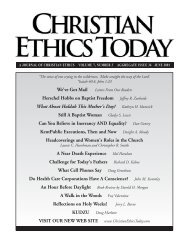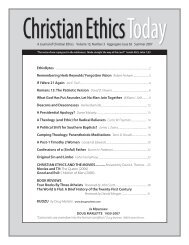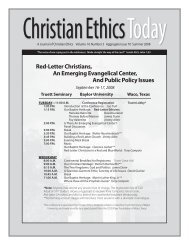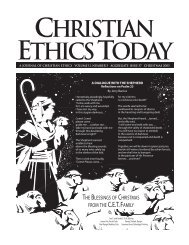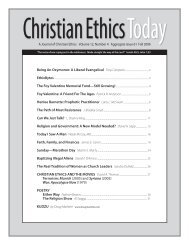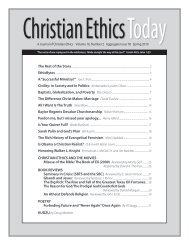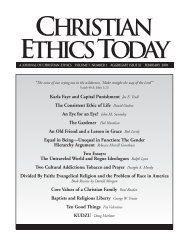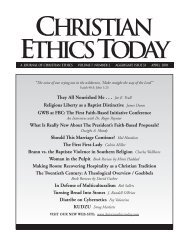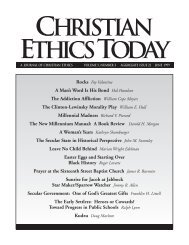Issue 048 PDF Version - Christian Ethics Today
Issue 048 PDF Version - Christian Ethics Today
Issue 048 PDF Version - Christian Ethics Today
Create successful ePaper yourself
Turn your PDF publications into a flip-book with our unique Google optimized e-Paper software.
ook Other Subversive Ideas by David Horowitz.<br />
A close examination of the Voter Guides reveals an obvious<br />
bias for the Religious Right and for Republican candidates<br />
and ultra-conservative positions. What is noticeably absent in<br />
these guides is any reference to economic justice, racial equality,<br />
and a <strong>Christian</strong> view of war and peace.<br />
The fact that these issues are seldom raised in Southern<br />
Baptist sermons, convention resolutions, Baptist Press news<br />
stories, and voter guides can most certainly be attributed to a<br />
recent shift in the SBC view of morality. During the last two<br />
decades the denomination’s ethical emphases have focused on<br />
personal morality, coupled with a growing silence regarding<br />
racial issues, lingering apartheid, anti-Semitism, nationalism,<br />
ecology, economic justice, and war and peace.<br />
Nothing is more demonstrative of the political marriage<br />
between Southern Baptists and the Republican Party than the<br />
tax cuts proposed by President Bush and the war on Iraq. It is<br />
common knowledge that George Bush’s tax cuts favor the<br />
wealthiest Americans while overlooking the poor. Leaders of<br />
some <strong>Christian</strong> denominations have expressed dismay over<br />
this economic injustice. Where do Southern Baptists stand on<br />
tax cuts? Apparently they stand with the Bush administration,<br />
for their silence regarding this inequity speaks volumes. Not<br />
to speak is to speak.<br />
What is so pernicious in moral statements set forth by<br />
Religious Right leaders—pastors, SBC executives, key churches,<br />
convention agencies, resolutions committees—is that their<br />
statements are accompanied by an air of biblical authority. It<br />
seems the SBC deems certain issues to be of primary importance<br />
to God, while other issues are not worth God’s or their<br />
concern.<br />
Do the SBC leaders, agencies, and key pastors speak with<br />
biblical authority? It is certainly difficult to find any references<br />
in SBC statements to the Hebrew prophets’ concern for justice<br />
in the courts and in the marketplace. Have Baptists ever<br />
asked how Isaiah, Jeremiah, Amos, and Micah might prophesy<br />
against our nation’s growing disparity between the rich and<br />
the poor? In addition, one would be hard pressed to hear a sermon<br />
on Matthew 25:31-46 (the passage in which Jesus identifies<br />
with those who are thirsty, hungry, naked and sick) from<br />
many pulpits. Although most Baptist churches have small<br />
scale mission projects that benefit a few of the needy in their<br />
communities, the SBC regularly endorses political candidates<br />
16 • FEBRUARY 2004 • CHRISTIAN ETHICS TODAY<br />
whose goals are to drastically cut or privatize government programs<br />
that are vital to the poorest Americans. What would<br />
Jesus say about preaching and practices that fail to address the<br />
needs of “the least of these” among us?<br />
Clarence Jordan, co-founder of Habitat for Humanity, was<br />
once admonished by a Baptist minister about his outspoken<br />
views regarding economic justice. The minister complained,<br />
“Why, if I said the things you are saying, I would lose my<br />
influence!” Jordan retorted, “It’s not your influence that you’re<br />
concerned about, it’s your affluence that you’re mighty concerned<br />
about losing.”<br />
For example, regarding the war on Iraq, SBC President<br />
Jack Graham and ethics concerns executive Richard Land gave<br />
their wholehearted endorsement of the attack on Iraq in<br />
March. Indeed, the SBC was the only major <strong>Christian</strong> denomination<br />
to lend support to this policy. Now the Bush administration’s<br />
proclaimed justification for the invasion of Iraq is in<br />
serious question since no weapons of mass destruction have<br />
been discovered to date. The issue of misinformation does not<br />
seem relevant to these Southern Baptists, as they now have<br />
changed their tune to comply with that of the administration<br />
and assure us that the “liberation” of the Iraqi people was sufficient<br />
justification for the invasion.<br />
While some might commend the SBC leaders for their<br />
sudden beneficent interest in the welfare of Iraqis, their statements<br />
in this regard are, at best, ambiguous. They, like the<br />
Bush administration, blithely ignore the fact that over 5,000<br />
Iraqi civilians have thus far perished as a result of the war<br />
(www.iraqbodycount.net). Thousands more sustained injuries<br />
and/or lost their homes and employment, to say nothing of<br />
the tens of thousands of Iraqi children who have died as a<br />
result of the twelve-year sanctions. The SBC concern for Iraqis<br />
also does not apparently extend to the thousands of young soldiers<br />
who were killed, although they had not committed a first<br />
aggression against our nation. Nor has there been any concern<br />
expressed about the devastation being caused by the multitude<br />
of unexploded cluster bombs and other munitions, “souvenirs”<br />
of the invasion that continues to kill and maim the Iraqi people—mostly<br />
children—who are unfortunate enough to come<br />
in contact with them.<br />
And what about our American troops who remain in grave<br />
danger and are still dying in the occupation of Iraq?<br />
It is becoming increasingly obvious that the main result of



